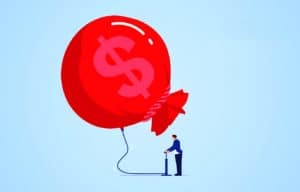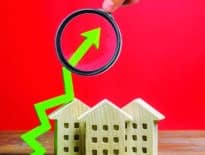
Some brokers worry that rampant bidding wars are inflating Greater Boston home prices to unsustainable levels.
Type “hot real estate market” into Google News and it will spit back at you more than 100 stories from every corner of the United States, from Massachusetts to California, with the words “hot” or “red-hot” in the headlines.
But “hot” is hardly the term I would use the describe the current market. “Chronically ill” is more like it.
Let’s face it: There has never been a worst time to buy a home. Prices have escalated dramatically since the pandemic, hitting record highs, with no signs of slowing.
More people want to buy a home than ever before, with our “K-shaped” recovery sending demand through the roof.
Able to work remotely, many white-collar professionals are in better shape financially than before the pandemic, with money to burn from cancelled vacations and the like and eager to spend it on larger, more comfortable homes, particularly in the suburbs.
Yet never has there been so little to choose from, with sellers holding back from trying the market due to COVID-19, making a long-standing shortage of new construction that much worse.
Sales of single-family homes surged 12.8 percent in February compared to the same month a year ago according to The Warren Group, publisher of Banker & Tradesman. But inventory, or the number of listings available for sale, plunged by more than 68 percent, according to the Massachusetts Association of Realtors.
The median sale price of a single-family home in Massachusetts hit a record $445,000 in February, up 17.1 percent from February 2020, according to The Warren Group.
And even with today’s sky-high prices, selling is almost as daunting at this point as buying.
After all, even if you get a great offer for your home, you still have to find a place to live. And that means compete with all the other hapless buyers out there for meager pool of listings on the market.
‘Unsustainable’ Valuations
But if the market is sick, it is also an increasingly hazardous, even dangerous one as well, and not just for all the buyers out there stretching their finances to the max in order to land something – anything – they can call home.
In the newly hot suburbs of Greater Boston, buyers are being forced to offer well over the listing price to have a shot at even having their bid considered.
Sara Rosenfeld, a premiere agent at Coldwell Banker in Cambridge, noted she just sold a single-family home in Malden for $50,000 over the list price to a pair of first-time buyers.
“I have to say that I have been doing this business for 39 years and have never seen this type of intense competition and buyers’ determination to do anything to get the house,” Rosenfeld said in an email.
Sam Schneiderman, principal broker of the Greater Boston Home Team, said it is not unusual now to see 20 offers on the typical suburban home.
One suburban home, with no garage and a tiny, 5,000–square–foot lot recently fetched over $840,000 – or more than 21 percent above its $700,000 asking price.
There were 23 offers.
Another house listed at $740,000 wound up fetching $900,000.
“When all was said and done, the seller’s agent said, ‘this is not a $900,000 house!’ Schneiderman said. “Almost every agent that I speak with is amazed by how high prices are getting bid up and we are talking about how unsustainable the current market is.”
Buyers Take Big Risks
And it’s not just bidding wars that are the problem here. Buyers are also being pressured into taking another big risk as well, removing inspection and other contingencies designed to protect new owners from unforeseen repairs and structural issues, brokers say.
Not surprisingly, Schneiderman, vice president of the Massachusetts Association of Buyer Agents, worries about the long-term financial consequences for buyers who stretch their finances to the limit to land a home.
Some are tapping into savings and retirement accounts in order to meet the demand for increasingly large down payments or all-cash offers on part of sellers.
“For me, the real question is what percentage of buyers need to move so badly that they are throwing all caution to the wind, willing to pay far more than the fair market value of a home,” Schneiderman said.
And he warns of potentially adverse, long-term consequences for some of these buyers, who may find themselves locked into “mediocre” homes they can’t resell later because the price they paid initially was far too high.
“The people that paid a significant premium for mediocre houses will probably see those premiums evaporate and some of them may get stuck in those homes through a market shift,” Schneiderman said. “Hopefully, those folks are paying a premium to stay in their new homes for many years to come.”
A Return to the Mid-2000s?
Yet more is at stake here than the errant decisions of buyers caught up in the heat of a massive upswing in home prices.
The larger market climate is also a serious concern, for today’s runaway prices very well may fuel tomorrow’s dramatic downturn.

Scott Van Voorhis
It’s exactly this kind of go-for-broke battle to land a home, driven by fear that prices will rise beyond reach and the opportunity to buy will slip away, that helped fuel the housing bubble of the mid-2000s.
We may already be in the throes of such a bubble, but probably won’t know it until it is about to burst, as bubbles are wont to do.
A market driven by fear, by buyers terrified if they don’t buy now, they will never be able to afford to buy, is not just a sick market, but a dangerous one for everyone involved.
Scott Van Voorhis is Banker & Tradesman’s columnist; opinions expressed are his own. He may be reached at sbvanvoorhis@hotmail.com.




 |
| 
